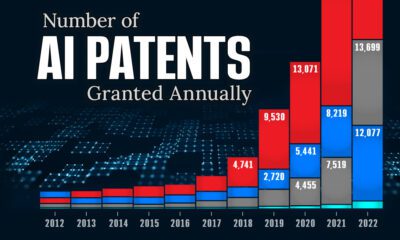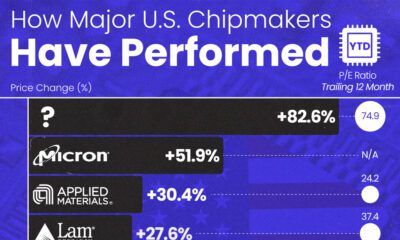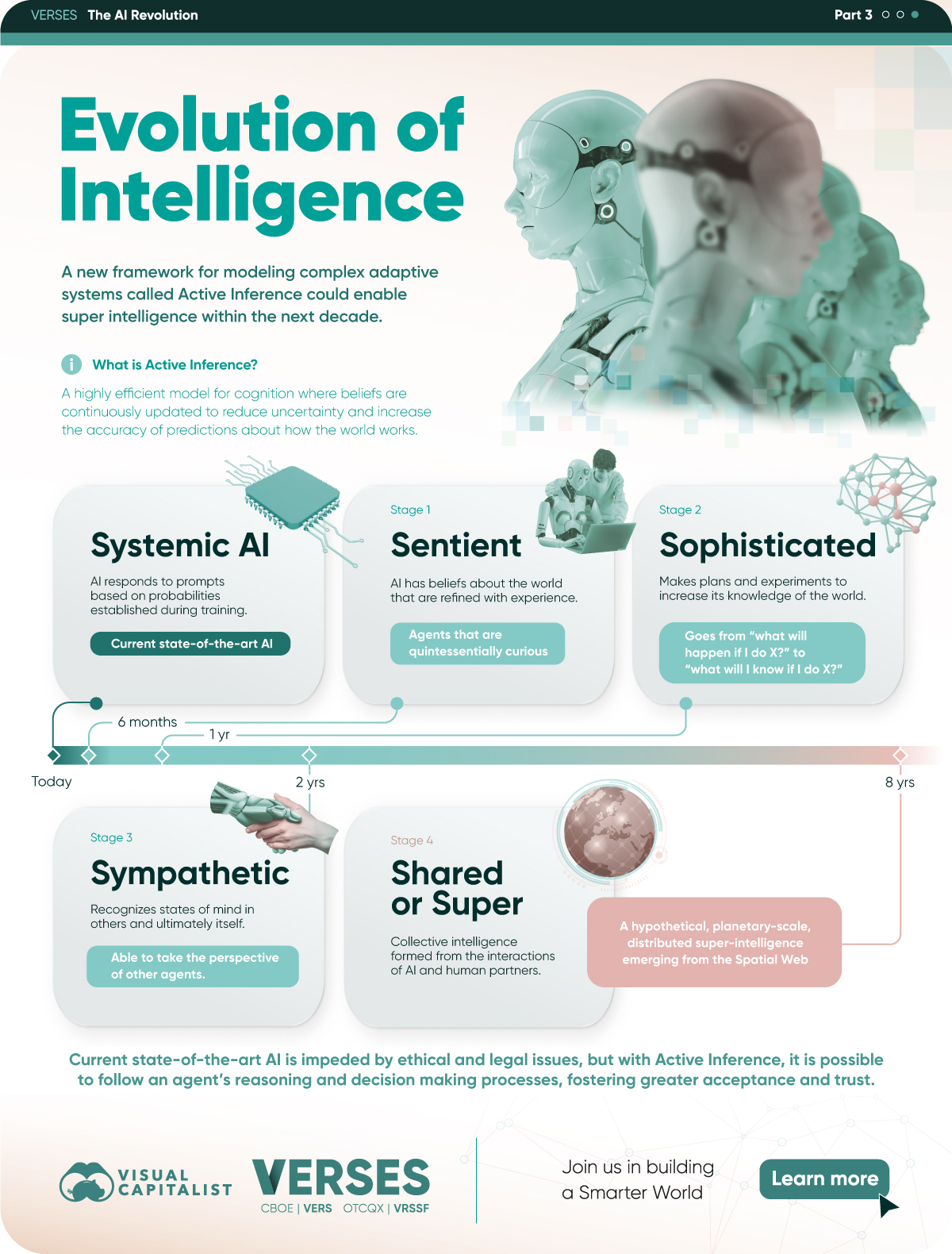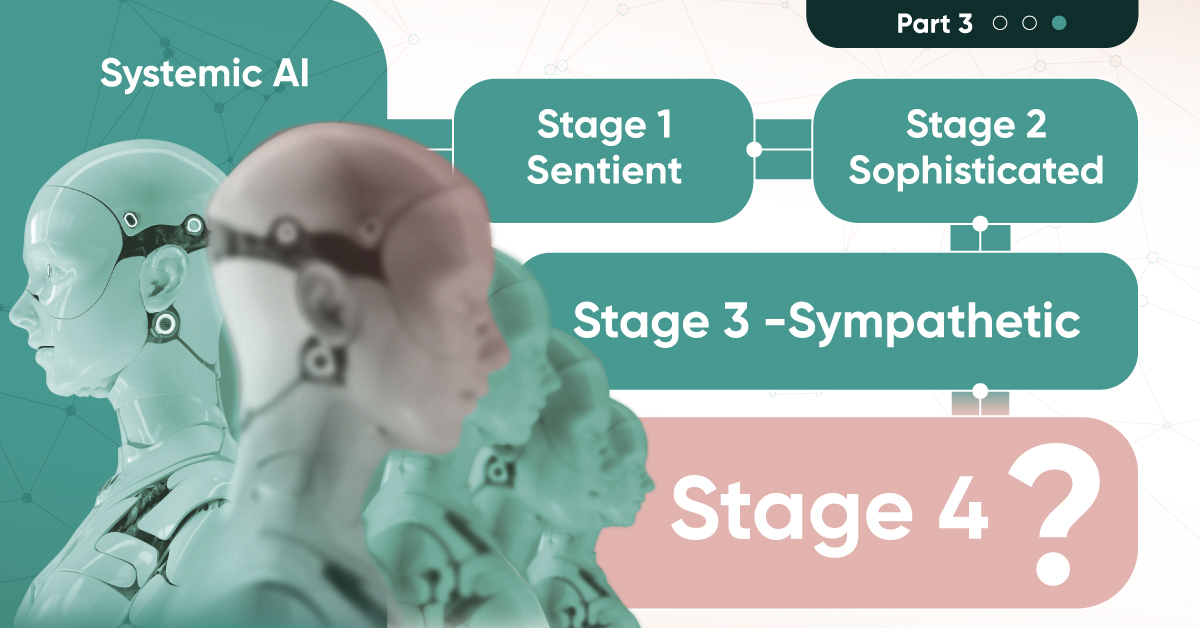The Evolution of Intelligence
The Evolution of Intelligence
The expert consensus is that human-like machine intelligence is still a distant prospect, with only a 50-50 chance that it could emerge by 2059. But what if there was a way to do it in less than half the time?
We’ve partnered with VERSES for the final entry in our AI Revolution Series to explore a potential roadmap to a shared or super intelligence that reduces the time required to as little as 16 years.
Active Inference and the Future of AI
The secret sauce behind this acceleration is something called active inference, a highly efficient model for cognition where beliefs are continuously updated to reduce uncertainty and increase the accuracy of predictions about how the world works.
An AI built with this as its foundation would have beliefs about the world and would want to learn more about it; in other words, it would be curious. This is a quantum leap ahead of current state-of-the-art AI, like OpenAI’s ChatGPT or Google’s Gemini, which once they’ve completed their training, are in essence frozen in time; they cannot learn.
At the same time, because active inference models cognitive processes, we would be able to “see” the thought processes and rationale for any given AI decision or belief. This is in stark contrast to existing AI, where the journey from prompt to response is a black box, with all the ethical and legal ramifications that that entails. As a result, an AI built on active inference would engender accountability and trust.
The 4 Stages of Artificial Intelligence
Here are the steps through which an active-inference-based intelligence could develop:
- Systemic AI responds to prompts based on probabilities established during training: i.e. current state-of-the-art AI.
- Sentient AI is quintessentially curious and uses experience to refine beliefs about the world.
- Sophisticated AI makes plans and experiments to increase its knowledge of the world.
- Sympathetic AI recognizes states of mind in others and ultimately itself. It is self-aware.
- Shared or Super AI is a collective intelligence emerging from the interactions of AI and their human partners.
Stage four represents a hypothetical planetary super-intelligence that could emerge from the Spatial Web, the next evolution of the internet that unites people, places, and things.
A Thoughtful AI for the Future?
With AI already upending the way we live and work, and former tech evangelists raising red flags, it may be worth asking what kind of AI future we want? One where AI decisions are a black box, or one where AI is accountable and transparent, by design.
VERSES is developing an explainable AI based on active inference that can not only think, but also introspect and explain its “thought processes.”

Join VERSES in building a smarter world.

-

 Technology3 days ago
Technology3 days agoAll of the Grants Given by the U.S. CHIPS Act
Intel, TSMC, and more have received billions in subsidies from the U.S. CHIPS Act in 2024.
-

 Technology5 days ago
Technology5 days agoVisualizing AI Patents by Country
See which countries have been granted the most AI patents each year, from 2012 to 2022.
-

 Brands1 week ago
Brands1 week agoHow Tech Logos Have Evolved Over Time
From complete overhauls to more subtle tweaks, these tech logos have had quite a journey. Featuring: Google, Apple, and more.
-

 Technology3 weeks ago
Technology3 weeks agoRanked: Semiconductor Companies by Industry Revenue Share
Nvidia is coming for Intel’s crown. Samsung is losing ground. AI is transforming the space. We break down revenue for semiconductor companies.
-

 AI3 weeks ago
AI3 weeks agoThe Stock Performance of U.S. Chipmakers So Far in 2024
The Nvidia rocket ship is refusing to slow down, leading the pack of strong stock performance for most major U.S. chipmakers.
-

 Technology4 weeks ago
Technology4 weeks agoRanked: The Most Popular Smartphone Brands in the U.S.
This graphic breaks down America’s most preferred smartphone brands, according to a December 2023 consumer survey.






